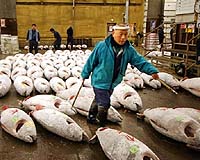 |
Santa Cruz, CA (SPX) Nov 09, 2010 A team of marine scientists has found that toxin-producing algae once thought to be limited to coastal waters are also common in the open ocean, where the addition of iron from natural or artificial sources can stimulate rapid growth of the harmful algae. The new findings, reported this week in the Proceedings of the National Academy of Sciences, add to concerns about proposals to use iron fertilization of the oceans as a way to combat global warming. Blooms of diatoms in the genus Pseudo-nitschia, which produce a neurotoxin called domoic acid, are a regular occurrence in coastal waters. During large blooms, the algal toxin enters the food chain, forcing the closure of some fisheries (such as shellfish and sardines) and poisoning marine mammals and birds that feed on contaminated fish. But until now, blooms of these algae in the open ocean have attracted little attention from researchers. "Normally, Pseudo-nitschia cells are sparse in the open ocean, so they don't have much effect. But these species are incredibly responsive to iron, often becoming dominant in algal blooms that result from iron fertilization. Any iron input might cause a bloom of the cells that make the toxin," said Mary Silver, professor emerita of ocean sciences at the University of California, Santa Cruz, and lead author of the new study. Because both natural and artificial additions of iron to ocean waters cause phytoplankton (single-celled algae) to grow vigorously, and because phytoplankton take up carbon dioxide as they grow, iron fertilization of the oceans has been suggested as way to reduce atmospheric concentrations of carbon dioxide and thereby combat global warming. "This work definitely reveals a wrinkle in those plans," said coauthor Kenneth Coale, director of Moss Landing Marine Laboratories. "It is much easier to break an ecosystem than it is to fix one. In light of these findings, we should redouble our efforts to reduce carbon emissions, the primary culprit for ocean ecosystem damage worldwide." In 2007, Silver accompanied Ken Bruland, professor of ocean sciences at UCSC, on a research cruise to study iron chemistry in the Gulf of Alaska. She saw Pseudo-nitschia cells often in samples collected at sea, and analysis of the samples back in the lab showed the presence of the domoic acid toxin. Those findings prompted her to team up with Coale to analyze old samples collected during iron-enrichment experiments conducted in 1995 and 2002. Coale was the principal investigator or chief scientist for these studies. "We thought the toxin would have broken down, but it was still there," Silver said. In addition to samples from the two iron-enrichment experiments, the researchers analyzed samples from three natural populations in the North Pacific. The results showed that oceanic waters throughout the Pacific contain Pseudo-nitschia populations associated with the domoic acid neurotoxin. Silver noted that blooms of Pseudo-nitschia must occur naturally in the open ocean as a result of iron deposited by dust storms, volcanic eruptions, and other airborne sources. "It is a natural phenomenon and likely has been for millions of years," she said. "But those are sporadic occurrences. To do iron enrichment on a large scale could be dangerous because, if it causes blooms of Pseudo-nitschia, the toxin might get into the food chain, as it does in the coastal zone." In addition to Silver, Coale, and Bruland, the coauthors of the PNAS paper include Sibel Bargu and Ana Garcia at Louisiana State University; Susan Coale and Kathryn Roberts at UC Santa Cruz; and Claudia Benitez-Nelson and Emily Sekula-Wood at the University of South Carolina. This research was funded by the National Science Foundation, U.S. Department of Energy, and U.S. Office of Naval Research.
Share This Article With Planet Earth
Related Links University of California - Santa Cruz Water News - Science, Technology and Politics
 Study: Tuna black market worth billions of dollars
Study: Tuna black market worth billions of dollarsWashington (AFP) Nov 7, 2010 The craze for sushi has fueled a black market in tuna worth billions of dollars, as governments collaborate with the industry despite fears for the species' survival, an investigation found. A seven-month probe by the International Consortium of Investigative Journalists found that fishermen have willfully violated official quotas in order to supply the lucrative tuna market, which is domina ... read more |
|
| The content herein, unless otherwise known to be public domain, are Copyright 1995-2010 - SpaceDaily. AFP and UPI Wire Stories are copyright Agence France-Presse and United Press International. ESA Portal Reports are copyright European Space Agency. All NASA sourced material is public domain. Additional copyrights may apply in whole or part to other bona fide parties. Advertising does not imply endorsement,agreement or approval of any opinions, statements or information provided by SpaceDaily on any Web page published or hosted by SpaceDaily. Privacy Statement |